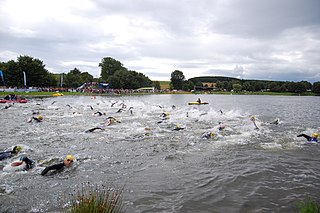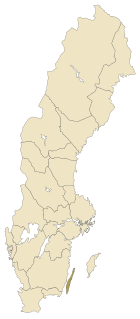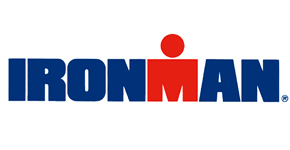
A triathlon is a multisport race with three continuous and sequential endurance races. The word is of Greek origin, from τρεῖς or treis (three) and ἆθλος or athlos (competition).
An Ironman Triathlon is one of a series of long-distance triathlon races organized by the World Triathlon Corporation (WTC), consisting of a 2.4-mile (3.86 km) swim, a 112-mile (180.25 km) bicycle ride and a marathon 26.22-mile (42.20 km) run, raced in that order and without a break. It is widely considered one of the most difficult one-day sporting events in the world.
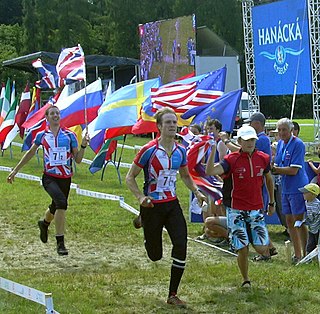
A relay race is a racing competition where members of a team take turns completing parts of racecourse or performing a certain action. Relay races take the form of professional races and amateur games. Relay races are common in running, orienteering, swimming, cross-country skiing, biathlon, or ice skating. In the Olympic Games, there are several types of relay races that are part of track and field.

Simon Christopher Lessing, MBE, is a British triathlete who won five International Triathlon Union (ITU) world titles. He also won races at 70.3, ITU long distance and Ironman-distance events. He set an Olympic-distance world record in 1996, and is noted for his 2004 Ironman Lake Placid win, where he set a course record of 8:23:12. In 2008 he retired from professional racing. Simon resides in Boulder, Colorado, United States, where he operates Boulder Coaching with Darren de Reuck.

Andreas Raelert is a German triathlete. His younger brother, Michael Raelert, is also a triathlete.
Andrew Robert Potts is a triathlete from the United States. He competed in triathlon at the 2004 Summer Olympics and is the 2007 Ironman 70.3 World Champion. Prior to triathlon, Potts was a swimmer where he won the bronze medal in the men's 400m individual medley at the 1995 Summer Universiade and earned a spot on the USA Swimming national team where he would place fourth at the 1996 Olympic Trials in the 400 IM.
An Ironman 70.3, also known as a Half Ironman, is one of a series of long-distance triathlon races organized by the World Triathlon Corporation (WTC). The "70.3" refers to the total distance in miles (113.0 km) covered in the race, consisting of a 1.2-mile (1.9 km) swim, a 56-mile (90 km) bike ride, and a 13.1-mile (21.1 km) run. Each distance of the swim, bike, and run segments is half the distance of that segment in an Ironman Triathlon. The Ironman 70.3 series culminates each year with a World Championship competition, for which competitors qualify during the 70.3 series in the 12 months prior to the championship race. In addition to the World Championship race, Ironman 70.3 championship competitions are also held for the European, Asia-Pacific, and Latin America regions.
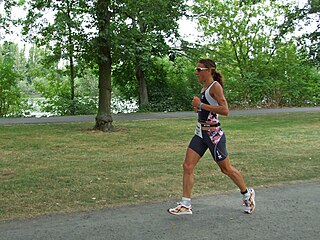
Christine Ann Wellington is an English former professional triathlete and four-time Ironman Triathlon World Champion. She holds, or held, all three world and championship records relating to ironman-distance triathlon races: firstly, the overall world record, secondly, the Ironman World Championship course record, and thirdly, the official world record for all Ironman-branded triathlon races over the full Ironman distance.
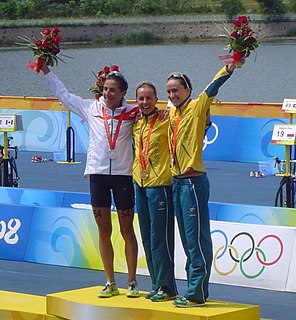
The women's triathlon was part of the triathlon at the 2008 Summer Olympics programme. It was the third appearance of the event, which was established in 2000. The competition was held on Monday, August 18, 2008 at the Triathlon Venue at the Ming Tomb Reservoir in Shisanling. Fifty-five triathletes from thirty nations competed.

Mirinda Carfrae is an Australian professional triathlete and an Ironman Triathlon world champion. Carfrae has achieved podium positions in six of her seven attempts at the Ironman World Championships: 1st-place finishes, three 2nd-place finishes and a 3rd place. She also won the 2007 Ironman 70.3 World Championship.
An ultra-triathlon is a long-distance triathlon. The term generally refers to all triathlon events of distance greater than the Ironman Triathlon. Thus, every ultra triathlon event must involve more than 2.4 miles (3.86 km) of swimming, 112 miles (180.25 km) of cycling, and a full marathon of running. The most common distances are the double, triple, quadruple, quintuple and deca triathlon. Unlike a standard triathlon event, an ultra-triathlon event may not necessarily involve the three component disciplines of triathlon in direct consecutive order, but may instead consist of multiple consecutive individual triathlons performed on consecutive days.

The triathlon events at the 2012 Summer Olympics were held in Hyde Park in London, United Kingdom, with the women's triathlon held on 4 August and the men's on 7 August. 110 triathletes from 39 countries competed with 55 men and 55 women competing. The races were held over the "international distance" and consisted of 1.5 kilometres (0.93 mi) swimming, 43 kilometres (27 mi) road cycling, and 10 kilometres (6.2 mi) road running.
The 2012 Ironman 70.3 World Championship was a triathlon competition held at Lake Las Vegas in Henderson, Nevada on September 9, 2012. The championship was sponsored by the United States Marine Corps and organized by the World Triathlon Corporation (WTC) and was the culmination of the Ironman 70.3 series of events that occurred from August 14, 2011 through August 13, 2012. Athletes, both professional and amateur, earned a spot in the championship race by qualifying in races throughout the 70.3 series.
The 2012 Ironman World Championship was a long distance triathlon competition held on October 13, 2012 in Kailua-Kona, Hawaii. The championship won by Pete Jacobs of Australia and Leanda Cave of England. It was the 36th such Ironman Triathlon World Championship, which has been held annually in Hawaii since 1978, with an additional race in 1982. The championship is organized by the World Triathlon Corporation (WTC).
Pedro Ribeiro Silva Gomes, is a Portuguese professional triathlete. He finished second at Ironman Florida in 2010, setting a national record at the time with a time of 8:19:26. He is also the only Portuguese athlete to have own an official full distance Ironman event. In international competition, he placed 5th at the European Long Course Championship in Vitoria-Gasteiz and 12th at the World Championship in Immenstadt in 2010. On his debut at the Ironman distance, Challenge Barcelona 2010, he placed 6th in a time of 8:25:53..

The men's triathlon was one of the triathlon events at the 2012 Summer Olympics in London, United Kingdom. It took place on 7 August 2012, featuring 55 men from 32 countries. It was the fourth appearance of an Olympic men's triathlon event since the first at the 2000 Olympics in Sydney. The race was around Hyde Park, a 1.42 km2 park in central London. The race was held over the "international distance" and consisted of 1.5 kilometres (0.93 mi) swimming, 42.959 kilometres (26.693 mi) road cycling, and 10 kilometres (6.2 mi) road running.
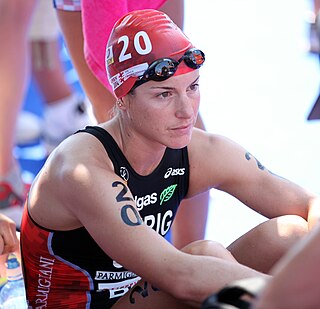
The women's triathlon was one of the triathlon events at the 2012 Summer Olympics in London, United Kingdom. It took place on 4 August 2012, featuring 55 women from 31 countries. It was the fourth appearance of an Olympic women's triathlon event since the first at the 2000 Olympics in Sydney, Australia. The race was around Hyde Park, a 1.42 km2 park in central London. The race was held over the "international distance" and consisted of 1.5 kilometres (0.93 mi) swimming, 43 kilometres (27 mi) road cycling, and 10 kilometres (6.2 mi) road running.
The women's triathlon was part of the Triathlon at the 2000 Summer Olympics programme. It was the first appearance of the event, and one of the first-day events at the 2000 Summer Olympics. The competition was held on Saturday, September 16, 2000 at the Sydney Opera House in Sydney.
The 2013 Ironman World Championship was a long distance triathlon competition that was held on October 12, 2013 in Kailua-Kona, Hawaii. The event was won by Begium's Frederik Van Lierde and Australia's Mirinda Carfrae. It was the 37th edition of the Ironman World Championship, which has been held annually in Hawaii since 1978. The championship is organized by the World Triathlon Corporation (WTC).
Britta Martin is a German born, New Zealand based professional triathlete and multiple winner of Ironman distance races all over the world.



